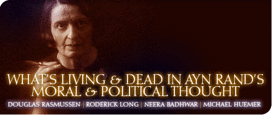About Neera’s message on the conflict of rational interests: Ditto that.
But now about her previous message, responding to me: We’ve mentioned the following premises and/or lemmas that appear in “The Objectivist Ethics” (taken from Neera’s message, slightly abbreviated):
1. Living things face an alternative of existence or non-existence.
2. Living things have a specific nature and must act according to that nature to survive.
3. Our means of survival is reason.
4. Reason functions volitionally.
5. To survive we must use our reason well and preserve our ability to reason well.
6. To reason well and live accordingly is to be virtuous.
First, I didn’t mean to imply that “Living things face an alternative of existence or non-existence” was the only premise deployed in the essay, and of course my one-line identification of the argument I was talking about does not give one the full picture of what goes on in the article.
However, as far as I understand the reasoning, premises (2)-(5) only seem to become relevant after you have established ethical egoism (perhaps the same is true even of premise (1)); I do not see how they are part of the premises used to establish egoism. (2)-(5) seem to be intended to show that, to survive, we must use our reason well and preserve our ability to reason well. But, what does that have to do with showing that the point of ethics is to serve one’s self-interest? It seems as though we are just presupposing that the purpose of ethics is to ensure one’s own survival. So it must be that that was supposed to be established already, right?
I’m not trying to saddle Neera with defending Rand’s argument in “The Objectivist Ethics”. I’m just trying to get more agreement on what the argument is. Whatever it is, I think egoism must have come out before things like (2)-(6). In fact, my own opinion is that egoism was simply presupposed, but that Rand represented it as having been proved.

